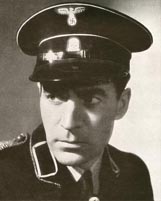


|

|
|
David Farrar 1908-1995 Autobiography: No Royal Road, 1947. Mortimer Publications. David Farrar was born on August 21st 1908, at Forest Gate, East London, the youngest of four children. He had an early interest in the theatre, playing Hermia in the school play at twelve. His first job on leaving school was as office boy at the Incorporated Society of Liscenced Victuallers for £1 per week. At 16 he became Assistant Editor on a monthly journal and then joined the Advertisers' Weekly. Various other writing assignments followed. Eventually he became director of a large publishing house. Throughout this period he took part in many amateur productions including a stage version of David Copperfield during which he met his wife, Agnes. It was she who persuaded him to take acting seriosly and they embarked on a production of The Wandering Jew in 1932. Good press notices led to further productions including; Captain Banner, The Immortal Lady (Bax) and The Firebrand. RKO Radio Pictures (UK) offered him a small part in 1936 but after seeing his rushes, he knew he had no technique as a film actor. However, by studying his fellow actors, particularly Ruth Chatterton, he gave a creditable performance in Royal Divorce. His salary was £10 per day. Small parts in Q Planes and Victoria the Great ended up on the cutting room floor.
After a slow start in the movies David returned to the theatre, producing as well as acting.
He hired The Grafton Theatre at the beginning of the Second World War and stayed there
for a year until it was bombed. He then returned to films in Sheepdog of the Hills,
Suspected Person came soon after starring opposite
Patricia
Roc and then the classic Went The Day Well?, the story of the Nazi invasion of a
small English village, directed by Cavalcanti.
|